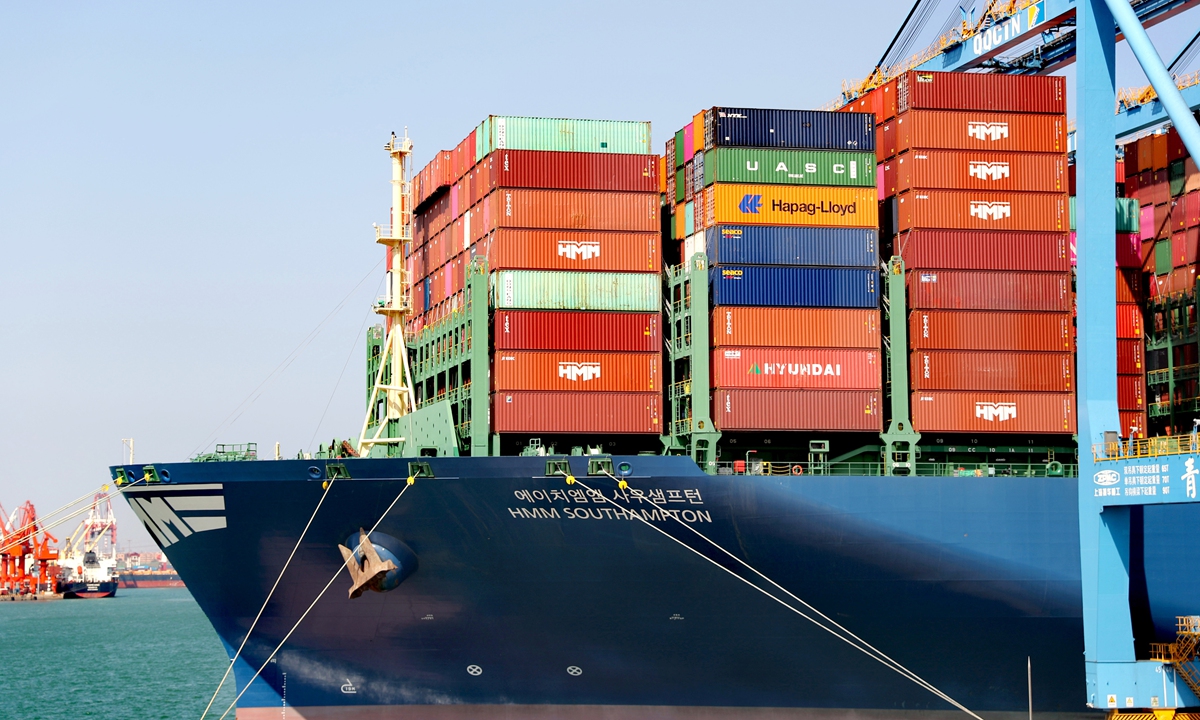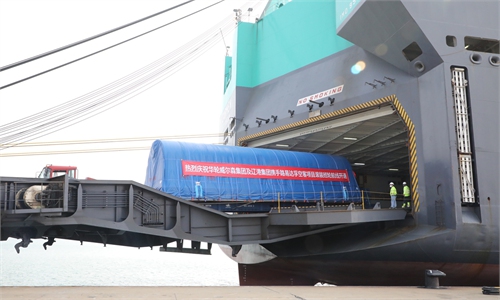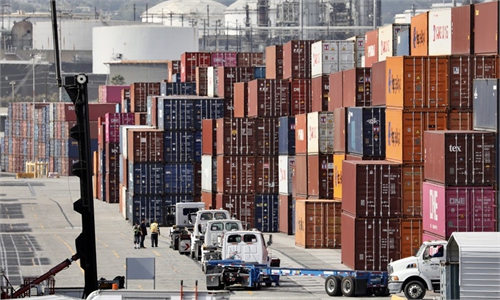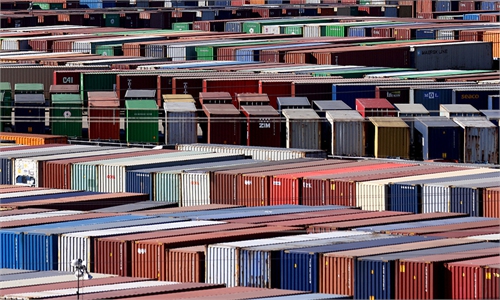Oil shipping increasingly disrupted
Tightened slots, container shortages, higher freight rates put new pressure on global supply chains

A ship loading foreign trade goods at Qingdao Port Fully Automated Container Terminal in East China's Shandong Province on Wednesday. Photo: cnsphoto
International traders and industry players fret the widening sanctions against Russia by the West would further disrupt the global supply chain, already pressured by the COVID-19 pandemic. They are keeping a close watch on how the situation evolves and make due contingency plans, the Global Times learned.
Global shipping lines are bearing the brunt of the impact of the conflict, with some countries like the UK and Canada deciding to suspend all Russian-owned or registered ships. The EU may follow suit, media reports said, as international shipping conglomerates such as Maersk and MSC announced service halts to Russia and Ukraine.
EU countries are considering a ban on Russian ships entering the bloc's ports, aiming to tighten sea restrictions after a halt on air traffic, Reuters reported, citing European officials.
This came after the UK announcement on Monday to deny entry to British ports of the ships that are Russian owned, operated, controlled, chartered, registered or flagged.
Maersk told the Global Times on Thursday that it is starting to see an impact on global supply chain flows, like delays, customs authorities detaining goods at transshipment centers, and unpredictable operational impacts.
Regarding regional impacts including China or specific trade routes, Maersk said it is too early to judge potential impacts. The company pledged to do its best to process and deliver all sanctioned bookings made prior to the announcement as planned.
While the direct impact on trade between China and Europe is limited, given that most of the trade routes between the two use the Suez Canal, experts said that potential disruption will be much wider and deeper not only to regional trade but the world.
"Some European clients have considered canceling orders that involve Russian ports, goods or businesses, to fend off the risks of disruption and losses," Zhong Zhechao, founder of One Shipping, an international logistics service consulting company, told the Global Times on Thursday.
Moreover, the sanctions have added uncertainty to the already volatile global shipping industry with tightened container availability and higher freight rates, Zhong said, noting that such an impact would be felt around the globe.
Shares of international logistics companies rose significantly on Thursday. Due to the rebound in commodity demand in the past months, the global container shipping supply chain is stretched, and the Ukraine crisis is exacerbating the crunch, analysts said.
An international trader based in Yiwu, East China's Zhejiang Province told the Global Times on condition of anonymity on Thursday that the company is keeping a close watch on the fast-changing situation in Europe and its possible impact on his business with Europe and the US.
"There seems to be a new tendency that the freight rate is going up, and we have to balance the transportation costs before taking new orders," he said, noting the escalating tensions in Europe are ratcheting up costs.
"About 30 percent of the operating costs of shipping companies are oil prices. Since the conflict began, oil prices have reached a high level for the past seven years, exceeding $100 per barrel, which will be passed on to the entire shipping industry, and ultimately the customers pay the bill," Zhong said.
One emerging challenge for the international shipping industry and the supply chain would be shortages of crew members and ships, a direct driver of freight rates, experts said.
Russia has a lot of cargo ships and tankers that could be disappearing from the market because of the West's sanctions, Zhong said.
The International Chamber of Shipping (ICS) warned that if the free movement of Ukrainian and Russian crew members is hindered, the global supply chain will be disrupted, according to media reports.
As of 2021, there were 1.89 million seafarers in the global fleet of ocean-going ships. Among them, there were 76,442 of Ukrainian nationality and 198,123 of Russian nationality, with the former accounting for 4 percent and the latter accounting for 10.5 percent, according to statistics compiled by the ICS.
In addition to the large number of crew members in the global shipping service, Russia's tankers also hold a very important role in the international shipping industry, especially when it comes to energy transportation.
Nearly 2 percent of the global tanker fleet is owned or controlled by Russian companies, according to Braemar ACM. Ownership is most concentrated in the aframax fleet, with almost 8 percent of the global aframax fleet owned by Russians.
As the crisis continues and sanctions add up, it is expected that more European and American countries will not use ports and sea lanes linking with Russia, Zhong said, indicating a much greater impact on global trade.
Chinese Foreign Ministry spokesperson Wang Wenbin said during a regular press conference on Wednesday that China firmly opposes all illegal unilateral sanctions, and believes that sanctions are never an effective way to solve problems.
"They [sanctions] will only create serious difficulties to the economies and livelihoods of relevant countries and intensify division and confrontation," Wang said.



